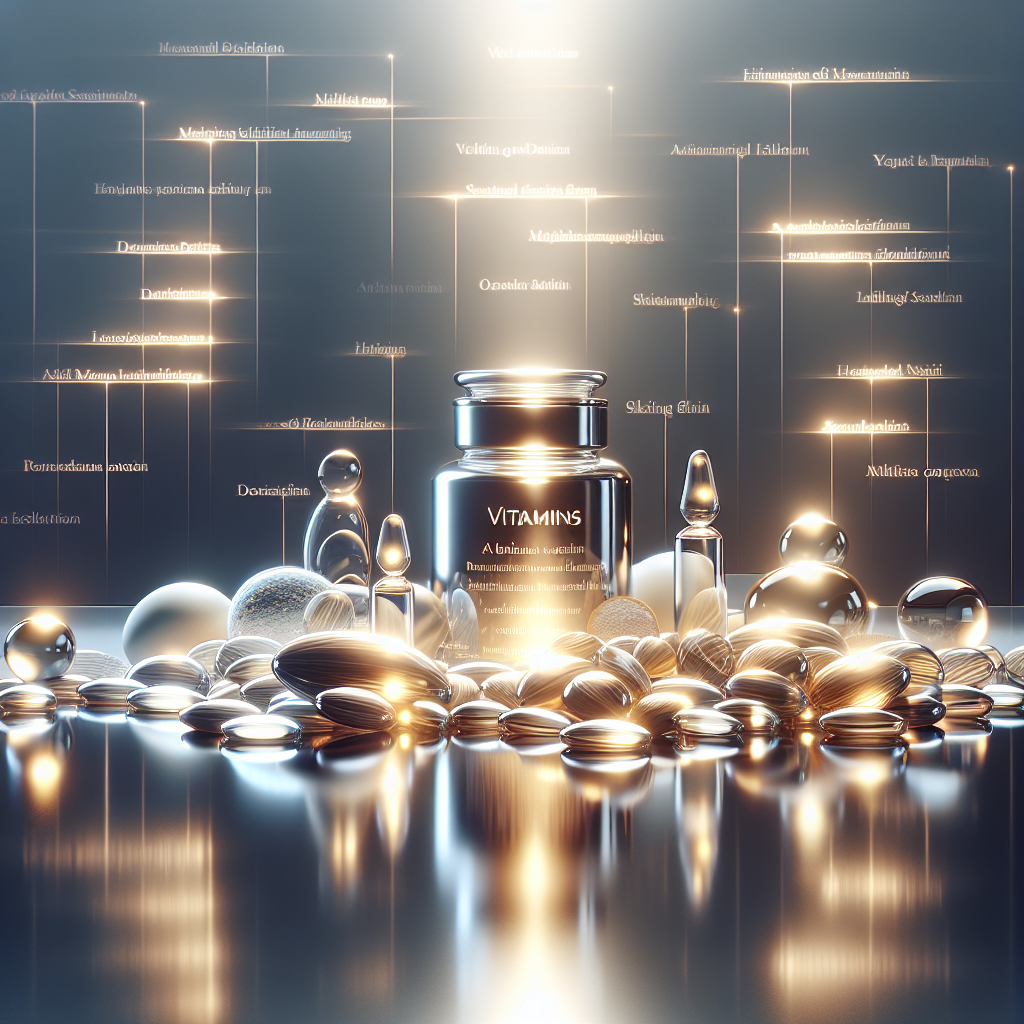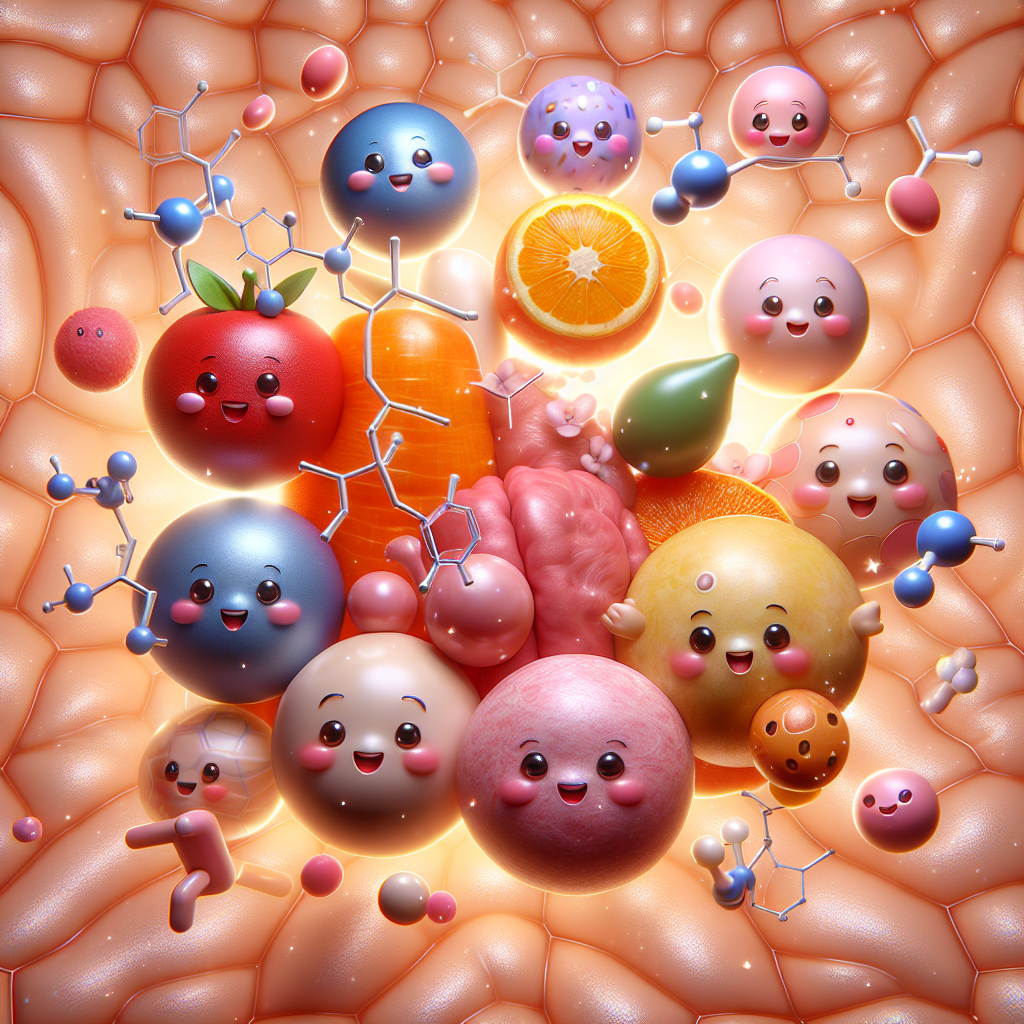Vitamins That Keep Skin Looking Youthful

Discover the secret to youthful-looking skin with our range of vitamins. Don’t wait, rejuvenate your skin today! Click here to explore our products.
Essential Vitamins for Maintaining Youthful Skin
The quest for youthful, radiant skin is a universal pursuit that transcends age, gender, and culture. While many turn to expensive creams, serums, and other topical treatments, the secret to maintaining youthful skin may lie in something far simpler and more accessible: vitamins. Indeed, certain vitamins play a crucial role in skin health, contributing to its elasticity, glow, and overall appearance.
Vitamin A, for instance, is a potent antioxidant that fights against the damaging effects of free radicals, which are unstable molecules that can cause premature aging. It also promotes the production of healthy skin cells, helping to keep the skin firm and smooth. Retinol, a derivative of vitamin A, is a common ingredient in many anti-aging skincare products due to its proven effectiveness in reducing the appearance of fine lines and wrinkles.
Vitamin C is another essential vitamin for maintaining youthful skin. Known for its powerful antioxidant properties, vitamin C aids in neutralizing harmful free radicals and repairing damaged skin cells. It also plays a crucial role in collagen synthesis, a protein responsible for skin’s elasticity and firmness. Regular intake of vitamin C can help to prevent and reduce signs of aging, such as wrinkles and age spots, and improve skin texture.
Vitamin E, like vitamins A and C, is a powerful antioxidant that protects the skin from the harmful effects of free radicals. It also has anti-inflammatory properties that can help to soothe and heal the skin, making it particularly beneficial for those with sensitive or irritated skin. Moreover, vitamin E helps to retain moisture in the skin, preventing dryness and keeping the skin hydrated and plump.
Vitamin B3, also known as niacinamide, is another key vitamin for skin health. It helps to improve the skin’s barrier function, which in turn helps to lock in moisture and protect the skin from environmental damage. Niacinamide also has anti-inflammatory properties and can help to reduce redness and irritation, making it beneficial for those with skin conditions such as rosacea or acne.
Vitamin K is often overlooked but is essential for maintaining youthful skin. It plays a crucial role in the body’s blood clotting process, which helps to heal wounds and bruises. Topical application of vitamin K can help to reduce the appearance of dark circles under the eyes, as it helps to improve blood circulation and reduce blood pooling.
In conclusion, vitamins play a vital role in maintaining youthful, healthy skin. Incorporating these vitamins into your diet and skincare routine can help to protect your skin from damage, improve its texture and appearance, and slow down the aging process. However, it’s important to remember that while vitamins can significantly contribute to skin health, they are not a substitute for a balanced diet, regular exercise, adequate sleep, and proper hydration. These lifestyle factors, combined with the right vitamins, can help you achieve and maintain the radiant, youthful skin you desire.
The Role of Vitamins in Skin Anti-Aging

The quest for youthful, radiant skin is a universal pursuit that transcends cultures and generations. While many factors contribute to the health and appearance of our skin, one aspect that often goes overlooked is the role of vitamins in skin anti-aging. Vitamins, both consumed through diet and applied topically, play a crucial role in maintaining the skin’s youthful glow and resilience.
Vitamin A, also known as retinol, is a powerhouse in the world of skin care. It promotes cell turnover, which helps to reduce the appearance of fine lines and wrinkles. It also aids in the production of collagen, a protein that gives skin its elasticity and firmness. Retinol can be found in a variety of skin care products, from serums to creams, and can also be consumed through foods like sweet potatoes, carrots, and spinach.
Vitamin C is another essential vitamin for skin health. It is a potent antioxidant that helps to neutralize harmful free radicals that can damage skin cells and accelerate the aging process. Vitamin C also plays a key role in collagen synthesis, helping to keep skin firm and youthful. Citrus fruits, strawberries, and bell peppers are all excellent sources of vitamin C.
Vitamin E, like vitamin C, is a powerful antioxidant that protects the skin from environmental damage. It also has moisturizing properties, helping to keep skin hydrated and plump, which can reduce the appearance of fine lines and wrinkles. Nuts, seeds, and leafy green vegetables are all good sources of vitamin E.
Vitamin K is less well-known than some of the other vitamins, but it plays a crucial role in skin health. It helps with blood clotting, which can aid in the healing of wounds and bruises. It may also help to reduce the appearance of dark circles under the eyes by improving blood circulation. Foods like kale, spinach, and broccoli are rich in vitamin K.
B vitamins, particularly B3 (niacin) and B5 (pantothenic acid), are also important for skin health. They help to retain moisture, reduce redness and irritation, and improve the skin’s elasticity. B vitamins can be found in a wide range of foods, including whole grains, meat, eggs, and legumes.
While vitamins play a crucial role in skin health, it’s important to remember that they are just one piece of the puzzle. A balanced diet, regular exercise, adequate sleep, and good skincare routine are all essential for maintaining youthful, healthy skin. It’s also important to protect your skin from the sun, as UV radiation can cause premature aging and other skin damage.
In conclusion, vitamins are a vital component in the fight against skin aging. Incorporating a variety of these nutrients into your diet and skincare routine can help to maintain your skin’s youthful glow and resilience. However, it’s important to remember that skin health is a holistic endeavor that requires a balanced approach to diet, lifestyle, and skincare. With the right combination of these elements, you can keep your skin looking youthful and radiant for years to come.
Top Vitamins to Incorporate for a Youthful Skin Glow
The quest for youthful, glowing skin is a universal pursuit that transcends age, gender, and culture. While many turn to expensive creams, serums, and other topical treatments, the secret to maintaining a youthful glow may be as simple as incorporating certain vitamins into your daily routine. These vitamins, whether obtained through diet, supplements, or topical applications, can provide the essential nutrients your skin needs to stay healthy, vibrant, and youthful.
Vitamin A, often found in retinol creams and lotions, is a powerhouse when it comes to anti-aging. It stimulates the production of new skin cells, helping to reduce the appearance of fine lines and wrinkles. It also aids in the repair of skin damage caused by sun exposure and environmental pollutants. Foods rich in Vitamin A include sweet potatoes, carrots, and dark leafy greens.
Vitamin C, also known as ascorbic acid, is another essential vitamin for skin health. It is a potent antioxidant that helps to neutralize harmful free radicals that can damage skin cells and accelerate the aging process. Vitamin C also plays a crucial role in collagen synthesis, which is vital for maintaining skin elasticity and firmness. Citrus fruits, strawberries, bell peppers, and broccoli are excellent sources of Vitamin C.
Vitamin E, like Vitamin C, is a powerful antioxidant that protects the skin from oxidative damage. It also has anti-inflammatory properties that can help to soothe and calm irritated skin. Vitamin E is often found in moisturizers and serums due to its ability to hydrate and nourish the skin. Foods rich in Vitamin E include nuts, seeds, and spinach.
Vitamin B3, also known as niacinamide, is gaining popularity in the skincare world for its wide range of benefits. It helps to improve skin elasticity, reduce redness and inflammation, and lighten dark spots. It also helps to strengthen the skin’s barrier function, which can protect against environmental damage and keep the skin hydrated. Foods high in Vitamin B3 include chicken, tuna, and mushrooms.
Vitamin K is another essential vitamin for skin health. It plays a crucial role in the body’s blood clotting process, which can help to heal wounds and reduce the appearance of bruises. It is also believed to help with dark circles under the eyes by improving blood circulation. Foods rich in Vitamin K include kale, spinach, and broccoli.
In conclusion, maintaining a youthful skin glow is not just about what you put on your skin, but also about what you put in your body. Incorporating these vitamins into your diet, either through food or supplements, can provide your skin with the essential nutrients it needs to stay healthy and vibrant. However, it’s important to remember that while these vitamins can support skin health, they are not a substitute for a balanced diet, regular exercise, and a good skincare routine. Always consult with a healthcare professional before starting any new supplement regimen. With the right combination of vitamins, a healthy lifestyle, and proper skincare, you can achieve and maintain that coveted youthful glow.